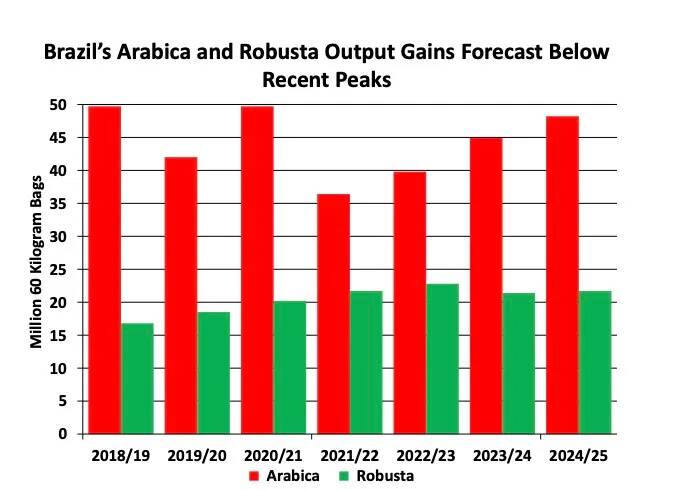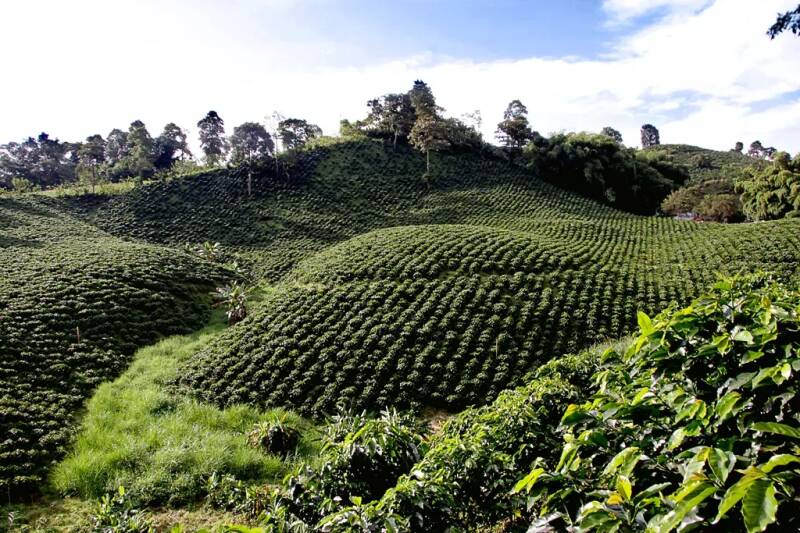The U.S. Department of Agriculture reports coffee production will reach 170 million bags in 2024/25
Recently, the United States Department of Agriculture released a coffee world market and trade report, which pointed out that world coffee production is expected to rise by 7.1 million bags to 176.2 million bags in 2024 / 25 compared with the previous year.
The increase in coffee production is mainly due to the continued recovery of coffee production in Brazil and the recovery of coffee production in Indonesia, and as supply increases, global coffee exports will increase by 3.6 million bags to 123.1 million bags.
In Brazil, total coffee production is expected to increase by 3.6 million bags to 69.9 million bags in 2024 / 25, of which Arabica coffee production increases to 48.2 million bags and Robusta coffee production increases to 21.7 million bags. In addition, due to the increase in supply, Brazilian coffee exports will increase to 42.5 million bags.

Although, in the first half of 2024, Brazil has been facing the impact of weather changes, with hot and hot weather in some areas, reduced rainfall and torrential rain in some areas. However, the impact is small, due to the high level of technology in some Brazilian states, the impact of drought can be mitigated by irrigation. And Brazil has continued to expand the planting area of coffee in recent years, so the output has increased.
In Colombia, El Ni ñ o began to have an impact on Colombian coffee producing areas in 2023 and lasted until the first half of 2024.

However, the impact of El Ni ñ o began to diminish at the beginning of this year, and Colombian coffee production has rebounded slightly in recent months. As a result, the report points out that coffee production in Colombia will reach 12.4 million bags, but due to news that the rate of local coffee moth pests is increasing, 12.4 million bags will be the highest production in the near future. and the current situation of Colombian coffee is difficult to reach the previous high point of the period 2011-2013, and the export volume has reached 10.8 million bags due to the increase in supply.
In other Central American countries, only Mexico's coffee production increased by 30, 000 to 3.9 million bags, and Nicaraguan coffee production is expected to increase by 300000 to 2.7 million bags. Production in Costa Rica, El Salvador, Guatemala, Honduras and Panama is basically the same as before, so the region's exports will increase to 13.4 million bags.
There is good news in Indonesia, coffee production is expected to season 2.8 million to 10.9 million bags. Although the bag coffee crop suffered heavy rainfall during its growth last year, the pollination conditions were not ideal. However, southern Sumatra and the low areas of Java were not affected, and favorable weather conditions increased Robusta coffee production by 2.7 million bags to 9.5 million bags, and exports also increased to 6.5 million bags.
But even if Indonesia's Robusta grows, it will not make up for the shortfall caused by the reduction in production in Vietnam. The report points out that Vietnam's coffee production will reach 29 million bags, the same as last year's data. However, Vietnam's domestic coffee consumption has increased, and exports will be reduced by 500000 to 24.4 million bags.
And Vietnam is still affected by drought in the first half of the year, with temperatures above average in many producing areas, the arrival of the rainy season has been delayed, and rainfall in the rainy season has been lower than average. Vietnam also has long-term problems such as insufficient groundwater, reduced forest cover and competition for other crops, but the government is launching a sustainable coffee production strategy that is expected to improve future production.
Important Notice :
前街咖啡 FrontStreet Coffee has moved to new addredd:
FrontStreet Coffee Address: 315,Donghua East Road,GuangZhou
Tel:020 38364473
- Prev

Introduction to Honduras 2024 COE Champion La Salsa Estate
In Central America, due to suitable geographical environment and other conditions, many countries grow coffee, such as El Salvador, Panama, Costa Rica, Honduras, etc. Among them, Honduras is currently the second largest coffee exporter in Central America and the tenth largest coffee exporter in the world. Honduras is located in Central America
- Next

Sorry to graduate! No one has taken over the 80-year-old coffee brand!
▲ Click to pay attention| The Daily Boutique Coffee Culture Magazine Coffee Workshop mentioned "Nanyang Coffee". Many friends should think of Malaysian white coffee. Among them, the very representative old street white coffee should be something many tourists must go to the local tea room when they arrive in Ipoh. I checked in. Ipoh is filled with the aroma of coffee,
Related
- What grade does Jamaica Blue Mountain No. 1 coffee belong to and how to drink it better? What is the highest grade of Blue Mountain coffee for coffee aristocrats?
- What are the flavor characteristics of the world-famous coffee Blue Mountain No. 1 Golden Mantelin? What are the characteristics of deep-roasted bitter coffee?
- Can I make coffee a second time in an Italian hand-brewed mocha pot? Why can't coffee be brewed several times like tea leaves?
- Hand-brewed coffee flows with a knife and a tornado. How to brew it? What is the proportion of grinding water and water temperature divided into?
- What is the difference between Indonesian Sumatra Mantinin coffee and gold Mantinin? How to distinguish between real and fake golden Mantelin coffee?
- What does bypass mean in coffee? Why can hand-brewed coffee and water make it better?
- Unexpected! Ruixing Telunsu lattes use a smoothie machine to foam milk?!
- % Arabia's first store in Henan opens into the village?! Netizen: Thought it was P's
- Does an authentic standard mocha coffee recipe use chocolate sauce or powder? Mocha Latte/Dirty Coffee/Salty Mocha Coffee Recipe Share!
- What is the difference between Vietnam egg coffee and Norway egg coffee? Hand-brewed single product coffee filter paper filter cloth filter flat solution!

